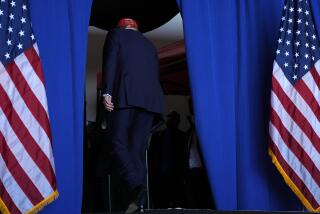Op-Ed: The secret to saner elections? Stronger state parties
- Share via
As I write these words, Donald Trump appears likely to win the Republican nomination for president even though he has not won a majority of votes in a single Republican primary. (His best showing was 49% in Massachusetts.) The second-place candidate, Sen. Ted Cruz, made his name in politics by lashing out against his own party — for example, by shutting down the government in a self-serving, if successful, bid to advance his political brand.
On the Democratic side, one of the two contestants for the nomination is not even a Democrat. Bernie Sanders is an independent who openly acknowledges that his switch to nominal Democratic affiliation in November was opportunistic. In primaries, he does well with independents but consistently loses among Democrats. Showing his true colors, he seems intent on staying in the race and hammering the likely Democratic nominee long after he has any chance of supplanting her, something no party loyalist would do.
Though political parties aren’t popular, they perform all kinds of positive and necessary functions in our system.
If you think the 2016 presidential race has been erratic, extreme and chaotic, you would be right. If you think the process is more responsive to angry minorities than broad majorities, that’s correct too. If you think the weakness of the political parties has something to do with the situation — you would be right yet again.
Here is the reigning political paradox of our era: Partisanship is strong, but parties are weak. As individuals, Republicans and Democrats pretty much hate one another. Yet, as institutions, both parties have lost much of their capacity to moderate the campaign process and discourage antisocial behavior by candidates. The result is a lot of crazy political driving on roads lacking medians and guardrails.
Is there a path back toward order? Yes. And it begins with state parties.
Though political parties aren’t popular, they perform all kinds of positive and necessary functions in our system. Because they take a long-term view of politics, they discourage renegade and extreme political behavior. Because they have a long-term interest in governing, they provide forums and incentives for legislative negotiation. In his new book, political scientist Raymond J. La Raja of the University of Massachusetts in Amherst finds that states with stronger parties have less polarized legislatures. No coincidence, that.
State parties play a key role. They recruit and cultivate political talent, building a farm team of candidates for higher office. They coordinate campaigns up and down the ballot, connecting politicians to each other and discouraging rogue behavior. They build networks of volunteers, connecting leaders with the party base. They gather voter data and make it available to all candidates, building a library of knowledge about the electorate. In all those ways and others, state parties provide what economists call public goods: benefits not just for themselves and their teams, but also for society as a whole.
La Raja and I recently surveyed and interviewed state parties for a new Brookings Institution report. We found that they are struggling to keep their heads above water as outside groups pump ever more resources into politics. That’s in no small part because of regulations that tightly limit state parties’ ability to raise and spend money and to coordinate campaigns. Even when they use state money to promote state (and local) candidacies, the state parties must follow restrictive federal rules that only a team of lawyers can understand. The rules were intended to reduce the pernicious role of money in politics, but their result — especially post-Citizens United — has been to weaken the state parties and drive money to unaccountable, often secretive outsiders.
Fortunately, rumors of state parties’ death are greatly exaggerated. Hundreds of state chairs, thousands of county party heads and tens of thousands of volunteers are still active and will do more if allowed. Better still, steps to reduce the artificial disadvantages under which these people labor are eminently practical. Here are a few suggestions.
Raise or eliminate restrictions on state parties’ ability to raise and spend money, strengthening their ability to compete with the unaccountable outside groups;
Get rid of obsolete restrictions on state parties’ ability to coordinate their candidates’ and activists efforts, allowing the parties to run coherent plays amid swarms of attack ads;
Make donations to state parties tax deductible, helping the parties compete for resources (and building on the nonprofit status they already enjoy for mailing purposes);
Prune the layers of federal regulation that needlessly and counterproductively hamper state parties’ ability to do their jobs.
Although these changes sound boring and incremental, that’s a good thing. Boring, incremental reforms have a better chance of passing than radical plans to transform the system, and are most likely to succeed. The road back from chaos is long, but the first steps are pretty easy.
Jonathan Rauch is a senior fellow at the Brookings Institution.
Follow the Opinion section on Twitter @latimesopinion and Facebook
More to Read
A cure for the common opinion
Get thought-provoking perspectives with our weekly newsletter.
You may occasionally receive promotional content from the Los Angeles Times.










